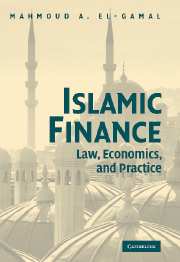Book contents
- Frontmatter
- Contents
- List of Illustrations
- Preface
- Glossary and Transliteration
- 1 Introduction
- 2 Jurisprudence and Arbitrage
- 3 Two Major Prohibitions: Riba and Gharar
- 4 Sale-Based Islamic Finance
- 5 Derivative-Like Sales: Salam, Istisna', and 'Urbun
- 6 Leasing, Securitization, and Sukuk
- 7 Partnerships and Equity Investment
- 8 Islamic Financial Institutions
- 9 Governance and Regulatory Solutions in Mutuality
- 10 Beyond Shari'a Arbitrage
- Conclusion
- Notes
- Bibliography
- Index
1 - Introduction
Published online by Cambridge University Press: 06 July 2010
- Frontmatter
- Contents
- List of Illustrations
- Preface
- Glossary and Transliteration
- 1 Introduction
- 2 Jurisprudence and Arbitrage
- 3 Two Major Prohibitions: Riba and Gharar
- 4 Sale-Based Islamic Finance
- 5 Derivative-Like Sales: Salam, Istisna', and 'Urbun
- 6 Leasing, Securitization, and Sukuk
- 7 Partnerships and Equity Investment
- 8 Islamic Financial Institutions
- 9 Governance and Regulatory Solutions in Mutuality
- 10 Beyond Shari'a Arbitrage
- Conclusion
- Notes
- Bibliography
- Index
Summary
In his Address to the Nobility of the German Nation in 1520, Martin Luther wrote:
A cobbler, a smith, a peasant, every man, has the office and function of his calling, and yet all alike are consecrated priests and bishops, and every man should by his office or function be useful and beneficial to the rest, so that various kinds of work may all be united for the furtherance of body and soul, just as the members of the body all serve one another.
A cobbler was said to have asked Luther how he could serve God within his trade of shoe making. Luther's answer was not that the cobbler should sell a “Christian shoe,” but rather that he should make a good shoe and sell it at a fair price. Most interesting in Luther's quote is the similarity of his message to Sunni Islamic traditions, wherein – at least in theory – there are no distinct categories of clergy and laity, and wherein all righteous acts – including fair dealings in the marketplace – are considered important parts of religious life.
The term “Islamic finance” brings to mind an analogy to the concept of a “Christian shoe,” rather than to good products that are fairly priced. Indeed, we shall see that the primary emphasis in Islamic finance is not on efficiency and fair pricing.
- Type
- Chapter
- Information
- Islamic FinanceLaw, Economics, and Practice, pp. 1 - 25Publisher: Cambridge University PressPrint publication year: 2006



